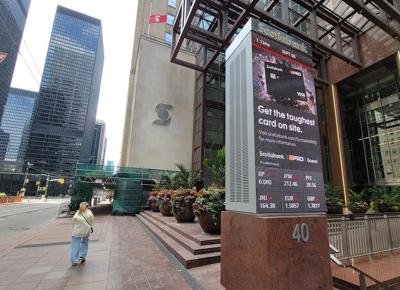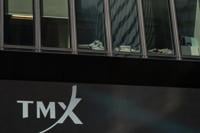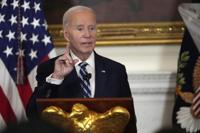Canada's main stock index climbed Monday as the price of oil and gold strengthened and investors continued to digest the market implications of another Donald Trump presidency.
The S&P/TSX composite index was up 86.26 points at 24,976.94.
In New York, the Dow Jones industrial average was down 55.39 points at 43,389.60. The S&P 500 index was up 23 points at 5,893.62, while the Nasdaq composite was up 111.69 points at 18,791.81.
Stock markets on both sides of the border have been in reaction mode since the Nov. 5 U.S. presidential election. Stocks initially surged on the so-called “Trump trade” before falling back last week amid investor questions about what the incoming president’s policies around tax cuts and tariffs could mean for interest rates and the broader economy.
Now that traders have had some time to digest the reality of another Trump administration, markets are starting to settle, said Brianne Gardner, wealth manager and financial advisor with Velocity Investment Partners at Raymond James Ltd.
“Markets don’t like uncertainty,” she said.
“But now we know who’s going to be in office, and we have more clarity on which sectors will benefit.”
Several big U.S. companies are lining up to report their latest quarterly results this week. The headliner arrives on Wednesday with chip-maker and market heavyweight Nvidia, but investors will also be watching Lowe’s and Walmart on Tuesday, Target on Wednesday and Deere on Thursday.
Gardner said in the wake of the post-election market surge, investors will be watching for signs that stocks have risen too high.
"We are watching signals closely. I think from a technical perspective, we are starting to see a little bit of deterioration in market breadth and the percentage of stocks with a bullish pattern, and that would suggest being a little bit cautious right now," she said.
"We wouldn't be surprised if we did see some sort of correction."
In Canada, the TSX got a lift Monday from higher oil prices and in particular, the strengthening price of gold, which gave mining stocks a boost. The S&P/TSX capped materials index was the day's biggest winner, gaining 2.84 per cent as the precious metal rebounded from last week's losses.
Underpinning it all, investors continue to try to determine the trajectory of continued interest rate cuts, both by the U.S. Federal Reserve and the Bank of Canada.
Here at home, the latest inflation reading from Statistics Canada is set to be released Tuesday. Gardner said most experts are expecting to see the cost of living ticked slightly higher in October, due largely to higher gasoline prices.
While that would be a break from the recent longer-term pattern of inflation rate declines, Gardner said she still expects further interest rate cuts from the Bank of Canada.
South of the border, the picture is less clear. The general consensus is still for the U.S. central bank to announce a 25-basis-point cut at its next meeting on Dec. 18, but Federal Reserve Chair Jerome Powell commented last week that there is no rush to continue to lower rates.
"It's still important to look at the overall economy, and the data there has been mixed," Gardner said.
The Canadian dollar traded for 71.21 cents US compared with 71.03 cents US on Friday. In spite of ticking slightly higher Monday, the loonie remains lower than it has been since the early days of the pandemic, and is nearly four per cent below where it was trading in September.
The loonie's slide comes as the U.S. greenback is soaring on the re-election of former president Donald Trump, gaining ground not just against the Canadian dollar but against a pack of foreign currencies.
Trump has promised to introduce sweeping tariffs on all U.S. imports, and about 75 per cent of Canada's total exports go to the U.S.
The weak loonie is also a reflection of the interest-rate divergence between Canada and the U.S.
Canada's economy in recent months has not shown the same strength as south of the border, and as a result, the Bank of Canada has moved to cut interest rates faster than its U.S. counterpart in an effort to avoid a recession.
The January crude oil contract was up US$2.14 at US$69.16 per barrel and the December natural gas contract was up 15 cents at US$2.97 per mmBTU.
The December gold contract was up US$44.50 at US$2,614.60 an ounce and the December copper contract was up six cents at US$4.12 a pound.
— With files from The Associated Press
This report by Ďă¸ŰÁůşĎ˛ĘąŇĹĆ×ĘÁĎ was first published Nov. 18, 2024.
Companies in this story: (TSX:GSPTSE, TSX:CADUSD)








































